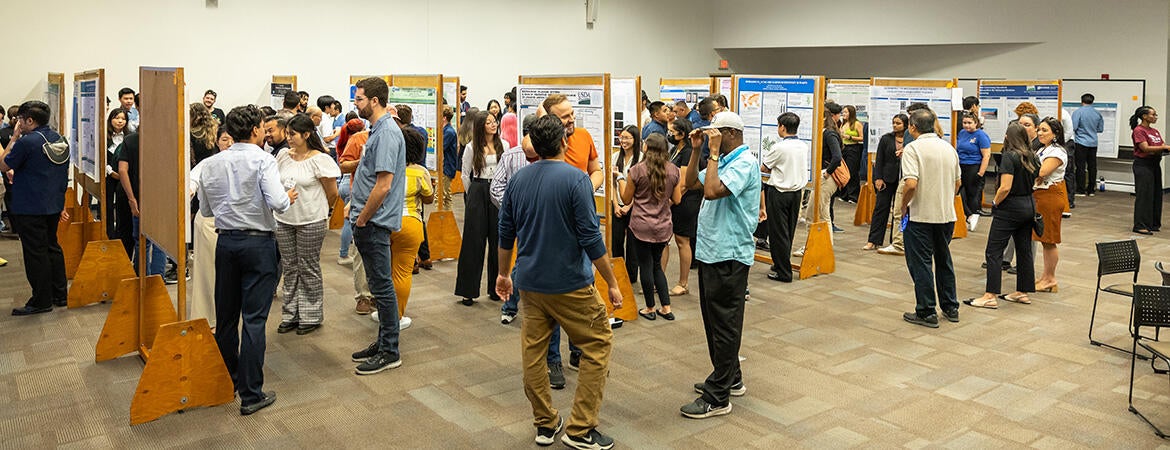
Well into its 10-week run, the Research in Science and Engineering Program (RISE) at UCR, not only benefits current UCR students, but also Riverside City College (RCC) students in ways that could shape their academic futures. RISE is designed for rising sophomores, juniors, incoming transfers (many from RCC), and seniors. The program is held annually each summer at UCR under the one-on-one supervision of faculty mentors who work with the students on cutting-edge research projects. The program, which is in its 15th year at UCR, began on June 23 and will finish on August 29.
According to Noel Salunga, Assistant Director of Student Success Program at CNAS and RISE coordinator for the last three years, 106 students are enrolled in this summer’s RISE program with about two-thirds of that total being UCR students and the remaining one-third from RCC.
In total, RISE allows participants to choose from a wide variety of labs – everything from studying climate change and other impacts on stream invertebrate biodiversity to understanding interactions between herbivores, their plant hosts and flower-visiting insects. There’s even a project that endeavors to explain why owls have quiet flight.
In addition to the lab work, RISE also features professional development opportunities, an immersive experience in the UCR science community and undergraduate symposiums and is divided into three cohorts that participate for the full 10 weeks, eight weeks, or in a concentrated one-week symposium that just finished July 11 under the supervision of Jim Burnette, Ph.D., Academic Coordinator at UCR.
“The one-week program was with the 21 Riverside City College students we had this summer,” Dr. Burnette said. “It gives them a taste of the kind of research we do here at UCR. They learn core microbiology techniques in our teaching labs and spend time exploring campus.”
Salunga said that Dr. Burnette’s one-week immersion program (formally named “RCC Tier One”) is relatively new to the overall RISE curriculum. “If you’re asking me about what’s recent within the last two years, it’s us trying to provide this sophisticated research experience in multiple formats,” he said. “In Jim’s program, now in its second year, in addition to the research lab work they do, the RCC students find out what life is like at UCR and that might encourage them to transfer to the college.”
Dr. Burnette said that in his RISE lab, students conduct an experiment that he routinely schedules with outreach students. “They take a piece of fish from the grocery store and do an experiment to see if that fish is labeled correctly,” he said. “If it’s an Ahi, is it truly a yellowfin tuna or something else? Sometimes, the more expensive labeled fish is really a lesser fish – it’s an experiment that keeps grocers on their game!
“They get to experience the science process from asking a question, generating and analyzing the data and then preparing an abstract and oral presentation,” he added.
After conducting a Basic Local Alignment Search (BLAST), that helps the students identify the species of the fish they were working with, Dr. Burnette said it was music to his ears to hear them exclaim: “’Oh, wow … I really did have a mackerel!’ Or ‘My cod was cod!’ They were super-excited to do the research.”
Salunga said that he sees a trend within the last couple of years of UCR aligning with community colleges and other schools to send their students to campus for the kind of study, research and networking opportunities that UCR excels at providing. But more than that, he’s witnessed an even bigger, more invaluable transformation that occurs at the individual student level.
“I feel like students as undergrads become consumers of knowledge,” he said. “Whether they’re chemistry students or biology students or even if they study English, they’re consuming knowledge. But when you go through a faculty/mentor research project like RISE, you transform from a consumer of knowledge to a producer of knowledge. You begin thinking in your own way and challenging whatever the material may be. You’re trying to dive deeper into it; running your own projects to find your own results and constructing your own narrative.”
Dr. Burnette attests to that transformation. He said that on the last day of his program, as the RCC students were finishing lunch, he noticed they were connecting on social media with each other and the UCR students who mentored them in the labs. “In one week, the students spent enough time with each other that they were starting to connect,” he said. “I know that four of the RCC students have already decided to attend UCR and that’s great because it means they know students on campus already.”